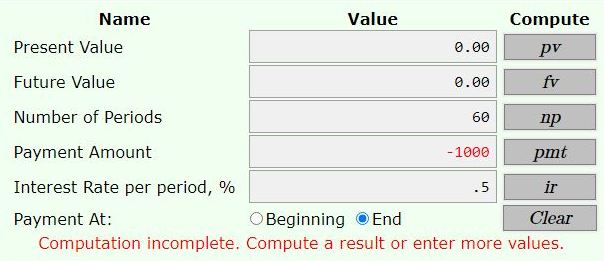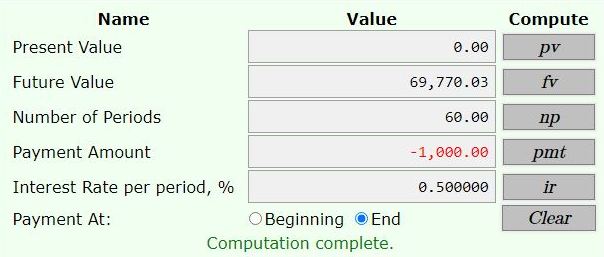Question 1185786: How much money will I have if I am going to deposit $1000 every month (starting now) for 5 years if the interest rates are 6%/a compounded monthly?
Found 2 solutions by Theo, ikleyn:
Answer by Theo(13342)   (Show Source): (Show Source):
You can put this solution on YOUR website! based on the following financial calculator, you will have ... in 5 years if you deposit 1000 at the end of each month with an interest rate of 6% per year compounded monthly.
your inputs are:
pv = present value = 0
fv = future value = 0
np = number of months = 5 years * 12 months per year = 60
pmt = amount deposited each month = 1000.
ir = interest rate per month = 6% per year / 12 = .5% per month.
payment is made at the end of each month.
your output will be fv = future value = $66,770.03
this is what the inputs look like.

this is what the output looks like.

Answer by ikleyn(52750)   (Show Source): (Show Source):
You can put this solution on YOUR website! .
How much money will I have if I am going to deposit $1000 every month (starting now)
for 5 years if the interest rates are 6%/a compounded monthly?
~~~~~~~~~~~~~~~~~
What @Theo calculated for you, was the Ordinary Annuity saving plan, when the regular deposits are made at the END of each month.
The given problem asks about the Annuity Due saving plan, when the regular deposits are made AT THE BEGINNING of each month.
So, @Theo's calculations are not appropriate for this problem.
THEREFORE, I came to bring you a correct solution.
It is a classic Annuity Due saving plan. The general formula is
FV =  , (1)
where FV is the future value of the account; P is your monthly payment (deposit); r is the monthly percentage yield presented as a decimal;
n is the number of deposits (= the number of years multiplied by 12, in this case).
Under the given conditions, P = 1000; r = 0.06/12; n = 12*5 = 60. So, according to the formula (1), you get at the end of the 20-th year
FV = , (1)
where FV is the future value of the account; P is your monthly payment (deposit); r is the monthly percentage yield presented as a decimal;
n is the number of deposits (= the number of years multiplied by 12, in this case).
Under the given conditions, P = 1000; r = 0.06/12; n = 12*5 = 60. So, according to the formula (1), you get at the end of the 20-th year
FV =  = =  = $70,118.88. ANSWER
Note that you deposit only 12*5*$1000 = $60,000. The rest is what the account earns/accumulates in 5 years. = $70,118.88. ANSWER
Note that you deposit only 12*5*$1000 = $60,000. The rest is what the account earns/accumulates in 5 years.
-----------------
On Ordinary Annuity and Annuity Due saving plans, see the lessons
- Ordinary Annuity saving plans and geometric progressions
- Solved problems on Ordinary Annuity saving plans
- Solved problems on Ordinary Annuity saving plans
in this site.
The lessons contain EVERYTHING you need to know about this subject, in clear and compact form.
When you learn from these lessons, you will be able to do similar calculations in semi-automatic mode.
|
|
|